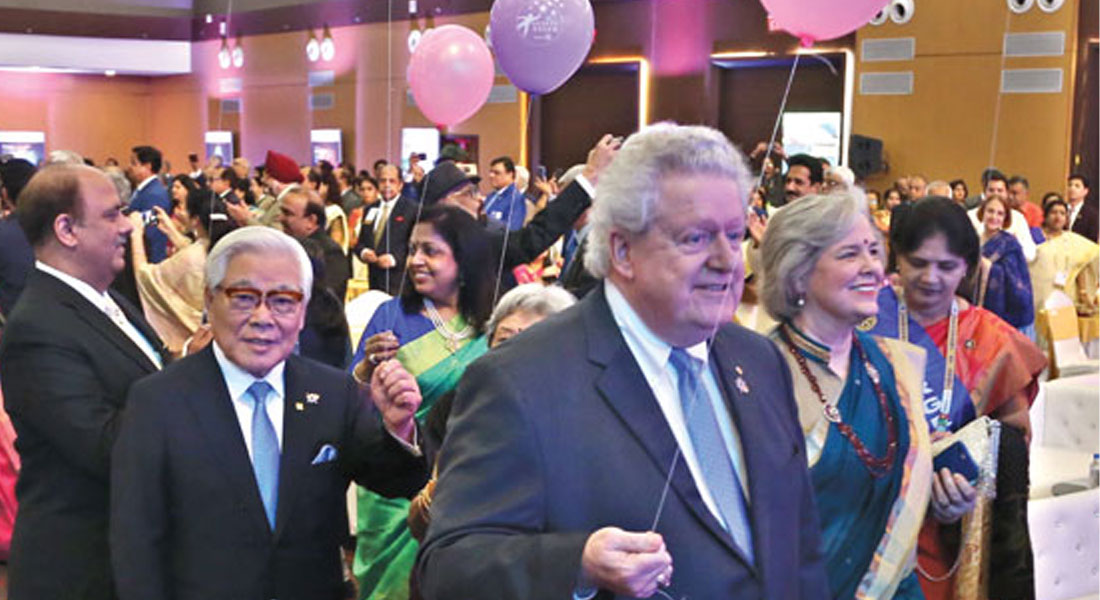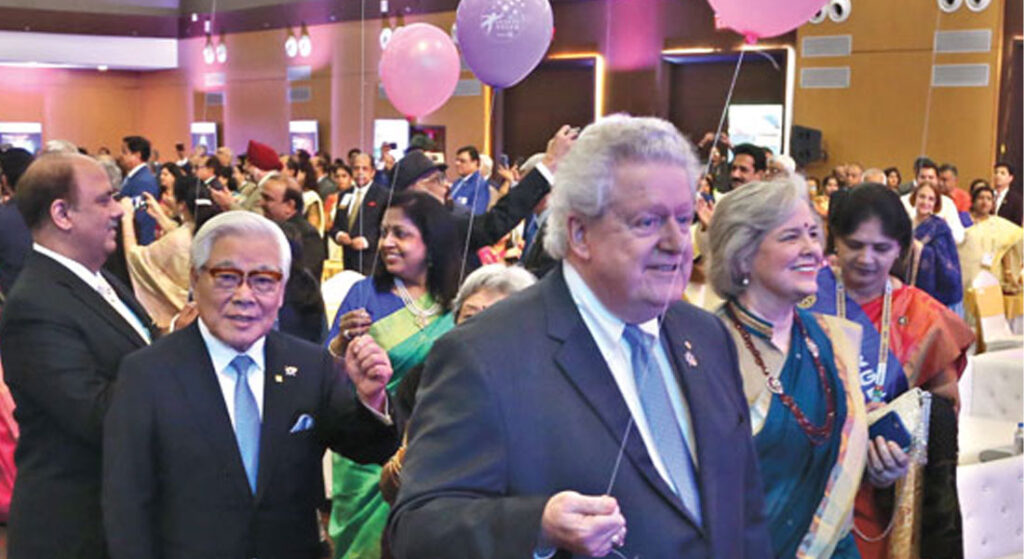
At the inaugural session of the Indore Institute RI President Mark Maloney made it evident that when he keeps reiterating his theme ‘Rotary connects the world’ or “growing Rotary”, these are not just “slogans” for him. “Growing Rotary is not just a one-year effort but there is so much we can accomplish if we start working now. When I say Rotary connects the world… it does so by investing in relationships, knowing how to mobilise our networks to create solutions that last, and we are always learning from our experiences in our projects and our clubs.”

Over a century ago Rotary had “pioneered a new model of service leadership grounded in person-to-person connections. Today those connections are a network that spans the globe, bridging cultural, linguistic, generational and geographic borders; and collectively all this has created a vision of a better world.”
Bringing in more members to replace those who leave is like pouring more water into a bucket with holes. We need to address the root cause — member engagement.
Calling upon Rotarians to “engage in deep and meaningful ways across our differences,” the RI President said the wonder of Rotary was connecting the world and its people who we would never otherwise have met and “who are more like us than we would have ever imagined. It connects us to our communities, professional opportunities and to the people who need our help. When you combine this network with the energy and commitment of Rotarians, the results are almost magical. We are people of action, and we have the ability to change the world because of who we are and what Rotary allows us to do.”
But fulfilling any vision requires a plan built on a foundation of Rotary connections. “And this year we are rolling out a new action plan which over the next five years will expand our reach, enhance our impact and increase our participation and engagement and increase our ability to adapt. This plan not only brings to life how Rotary connects the world, but is also clear-eyed about the challenges that Rotary faces and is rooted in our historical values of fellowship, integrity, diversity, service and leadership,” he added.

This new action plan also recognises the value of human connections in a time “when technology can make it actually harder to connect. The plan draws on the remarkable capabilities of Rotarians as professionals and respects that younger generations have different ideas about how to spend their time, who they spend it with and what motivates them.”
Rotarians’ ability to make a larger impact is hinged upon more people joining hands with them. Maloney said that by making Rotary larger and more diverse “we tell a wider and more emphatic story and give people hope that the world can change for better. This will create a continuous cycle where more and more people will want to be a part of our amazing success and share our vision.” More members would not only mean more hands doing service projects but also “more brains solving problems.”
Even as Rotary adapted to change (see box) it would have to safeguard its historic relationships, such as that with the United Nations. “There are so many parallels in the work we do through our areas of focus and the UN’s Sustainable Development Goals which are incredibly ambitious. Rotary was there at the beginning of the UN, and when the world pulled itself from the brink of destruction and was rebuilt.”
As the UN will soon mark the 75th anniversary of signing the UN Charter, to celebrate its relationship with the UN, Rotary is hosting four special events, including Presidential conferences in Paris and Rome and a final celebration just before the Honolulu Convention. This relationship was an example of “how together we can serve the world. Alone we cannot provide water for everyone, eliminate hunger or eradicate polio. But together, of course we can. We will build on our proud heritage and thrive for another 114 years because we are not afraid to change,” concluded Maloney.
Pictures by Rasheeda Bhagat
Challenges facing Rotary
Striking a serious and introspective note at the inaugural session, and addressing the challenges Rotary faces, RI President Mark Maloney said that every year “we talk about the same issues in different ways.” In some parts of the world such as India and Asia Rotary was growing rapidly but not in other parts. “Bringing in more members to replace the ones who leave is not the answer. It’s like pouring more water into a bucket with holes.We need to address the root cause — member engagement and member demographics that are skewed. We have to make some fundamental changes. We know what the barriers are to engage a diverse membership. It is time to act on what we know.”
And this was to create more membership models, new paths to building more Rotary and Rotaract clubs where the existing club do not meet the current needs.
Expanding Rotary’s reach was just one of the four goals in the new action plan, other three were increasing our impact, enhancing participation and meeting the participants’ needs to be heard and served. “They are seeking experiences that are relevant and fulfilling, and we have to make these available to them, while making Rotary more family-friendly.”
The final priority was increasing “our ability to adapt”, which Rotarians had already proved by succeeding in their careers. “Bringing new approaches to our organising principles do not threaten our sense of who we are. We have to respect professional commitments and not expect Rotary leadership to be a full-time job. Respect the time and responsibilities of younger people who are building their careers. Let’s open up our conversations to diverse voices and simplify how we operate with confidence. Let’s stay true to ourselves by staying ahead of change in our next
114 years,” he added.






